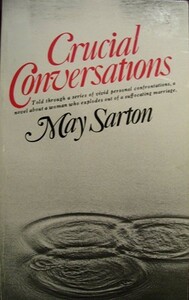Take a photo of a barcode or cover
Nothing new. Pretty basic stuff. Essentially the message is 'grow a pair and say what has to be said'.
emotional
reflective
tense
medium-paced
Plot or Character Driven:
Character
Strong character development:
Complicated
Loveable characters:
Yes
Diverse cast of characters:
Complicated
Flaws of characters a main focus:
Yes
This is a great slice of life book, that shows the reality of a changing relationship and marriage for a couple in their 60s. Its true and realistic and doesn't sugarcoat or demonize humans and divorce.
I did not realize that there were such differences between the way that men and women think until I read this book. Unfortunately, that's because the author didn't understand those differences when she wrote the book.
Every character in this book is a woman. Some are called men, but they very much act and think as if they were women. I'm not even sure why she bothered calling them men at all; the way it's written, the story would make more sense as the breakup of a lesbian relationship.
The relationship at the core of the story breaks apart because the wife (that is, the woman she calls a woman) is bipolar. The author doesn't call it that, preferring instead to pretend that her manic episodes are just the whims of an artist, and her depressive episodes are solely because she is stuck in a marriage with a man who doesn't understand her. I have to believe that much of this is based on real events, as she gives a perfect description of a sick woman and never once realizes it.
The woman she calls a man would be the true hero of the story if Sarton had any awareness of the story she was writing between the lines. His wife brings him nothing but misery, and all he wants at the end of the day is to stay married to her. But she has to leave him, you see, because she'san artist sick, and Watergate was so jarring delusional. One can only hope the person she describes eventually sought help.
This has the distinction of being the worst book I have ever read.
Every character in this book is a woman. Some are called men, but they very much act and think as if they were women. I'm not even sure why she bothered calling them men at all; the way it's written, the story would make more sense as the breakup of a lesbian relationship.
The relationship at the core of the story breaks apart because the wife (that is, the woman she calls a woman) is bipolar. The author doesn't call it that, preferring instead to pretend that her manic episodes are just the whims of an artist, and her depressive episodes are solely because she is stuck in a marriage with a man who doesn't understand her. I have to believe that much of this is based on real events, as she gives a perfect description of a sick woman and never once realizes it.
The woman she calls a man would be the true hero of the story if Sarton had any awareness of the story she was writing between the lines. His wife brings him nothing but misery, and all he wants at the end of the day is to stay married to her. But she has to leave him, you see, because she's
This has the distinction of being the worst book I have ever read.

